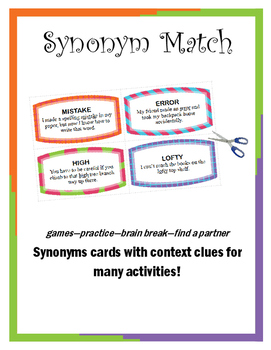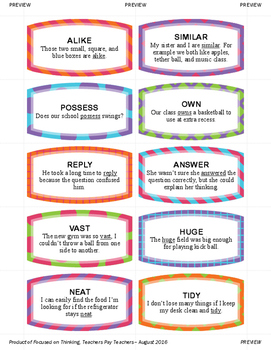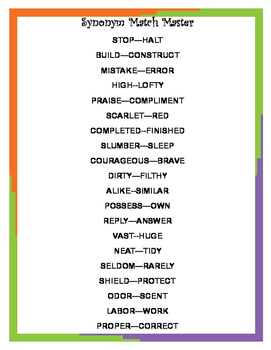Synonym Match Cards (+context clues!) - Find Partners/Pairs Game
Focused on Thinking
23 Followers
Grade Levels
3rd - 5th
Subjects
Resource Type
Standards
CCSSL.3.4a
CCSSL.4.4a
CCSSL.4.5c
CCSSL.5.4a
CCSSL.5.4c
Formats Included
- Publisher files
Pages
6 pages
Focused on Thinking
23 Followers
Description
This product contains 20 pairs of synonym cards (40 words total.) Each card has the word as well as the word in context.
There are several options for how to use these cards:
-As a whole group activity, each student gets a card and needs to find the classmate who has the matching synonym. Play as a practice or review game, a brain-break, or a way to find partners for another activity (i.e., if Student A gets 'tidy' and Student B gets 'neat,' they are now partners!)
-As an individual or small group activity where students look at all the cards and make pairs, or turn them upside-down and make pairs in a memory game.
-Students can also focus on the context clues, identifying what the clues are on each card. Synonym work also helps students to distinguish shades of meaning between words.
A master sheet shows all the correct synonym pairs.
The cards are targeted toward 3rd-5th grade students. The level of vocabulary varies for the synonyms, to be inclusive of reading and language levels.
Students learn synonyms, vocabulary, and context clues. The variety of possible activities offer inter-personal and oral language practice.
Have some fun while working with language!
There are several options for how to use these cards:
-As a whole group activity, each student gets a card and needs to find the classmate who has the matching synonym. Play as a practice or review game, a brain-break, or a way to find partners for another activity (i.e., if Student A gets 'tidy' and Student B gets 'neat,' they are now partners!)
-As an individual or small group activity where students look at all the cards and make pairs, or turn them upside-down and make pairs in a memory game.
-Students can also focus on the context clues, identifying what the clues are on each card. Synonym work also helps students to distinguish shades of meaning between words.
A master sheet shows all the correct synonym pairs.
The cards are targeted toward 3rd-5th grade students. The level of vocabulary varies for the synonyms, to be inclusive of reading and language levels.
Students learn synonyms, vocabulary, and context clues. The variety of possible activities offer inter-personal and oral language practice.
Have some fun while working with language!
Total Pages
6 pages
Answer Key
Included
Teaching Duration
N/A
Report this resource to TPT
Reported resources will be reviewed by our team. Report this resource to let us know if this resource violates TPT’s content guidelines.
Standards
to see state-specific standards (only available in the US).
CCSSL.3.4a
Use sentence-level context as a clue to the meaning of a word or phrase.
CCSSL.4.4a
Use context (e.g., definitions, examples, or restatements in text) as a clue to the meaning of a word or phrase.
CCSSL.4.5c
Demonstrate understanding of words by relating them to their opposites (antonyms) and to words with similar but not identical meanings (synonyms).
CCSSL.5.4a
Use context (e.g., cause/effect relationships and comparisons in text) as a clue to the meaning of a word or phrase.
CCSSL.5.4c
Consult reference materials (e.g., dictionaries, glossaries, thesauruses), both print and digital, to find the pronunciation and determine or clarify the precise meaning of key words and phrases.





